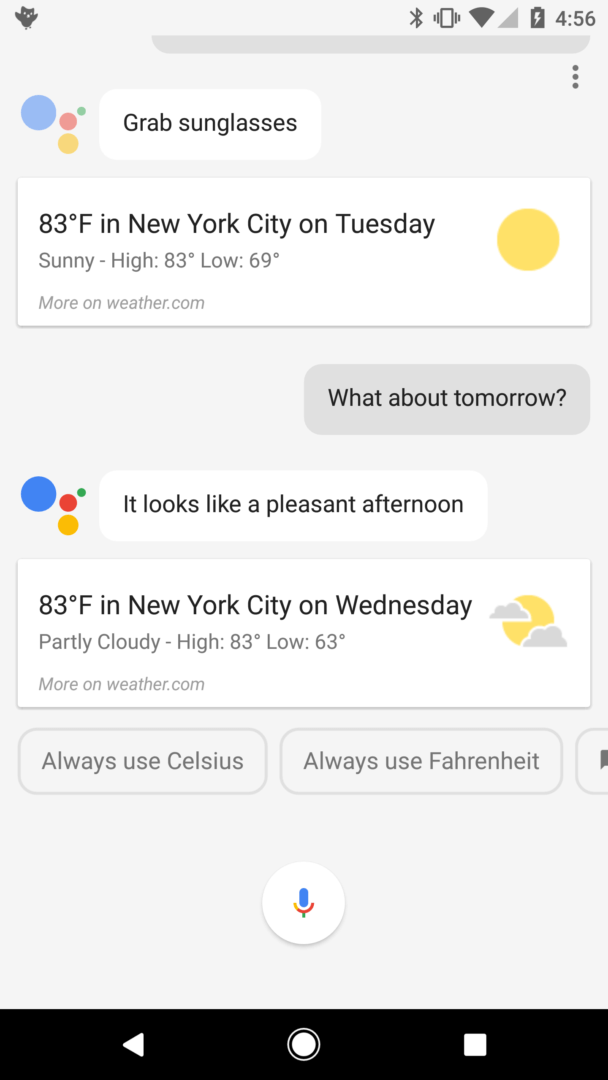Google Assistant is only an incremental advance over current voice search
High expectations made me want it to do more and be more naturally conversational. That will come.

You want it to do more. That was my feeling about the Google Assistant after using the new Pixel XL for several days.
The Pixel is a very nice phone with a great camera and a beautiful screen. It’s going to be a hit. But an iPhone killer it is not.
Google is promoting the Pixel as “The first phone with the Google Assistant built in.” The Google Assistant is useful and holds great promise, but in this “1.0” version, Google has oversold it. What you get is a user experience identical to what Google is delivering in Allo, but with voice playback. Allo’s version of the Assistant is mute.
Danny Sullivan discusses what he feels are shortcomings around Google Assistant usability on MarketingLand. He focuses on the fact that you can’t manually type a question into Google Assistant; it can only be initiated by voice. My frustrations were not focused on that issue so much as the fact that you can’t hold a true “conversation” with the Assistant.
To invoke Google Assistant, you can either use “OK Google,” as you can today to trigger a voice command or search query, or you touch the microphone icon or or one of the “follow-up” buttons (image below).
My greatest frustration was that each command or query had to be separately initiated. Putting the buttons aside, users need to touch the mic or say “OK Google” again before each new search or follow-up. And while the Assistant understands pronouns and context, you can’t have the kind of multi-step interaction with the Assistant I had hoped.
I wanted to just keep talking, without these “manual” search interactions. To be clear, however, my criticisms come from very high expectations. If your first experience with voice search were to be the Google Assistant on the Pixel, you’d be impressed and very pleased, I suspect.
With Amazon’s Alexa Kayak “skill,” you can carry on a guided multi-step conversation around travel (e.g., rental car reservations). This is the kind of thing I was hoping to be able to do with Google Assistant: do a search and ask several follow-ups without interruption.
Without consciously doing this, I found myself formulating queries and commands in a much more conversational style than with current voice search. I wanted to talk to Google Assistant much more like a human.
It’s also something of a disappointment that so many voice queries are “answered” with web links. This won’t be a problem for most people (especially SEOs), but I wanted voice answers and more cards, rather than links to websites. I found myself disappointed when Google pushed links.
While it will become more interactive over time, right now Google Assistant isn’t much different from the voice search/command experiences you’re already used to on Android phones.
In the coming days and weeks, we’re going to see a bunch of “Google Assistant vs. Siri” articles. Generally, Google Assistant can do more and offers more functionality because of Google’s search index. Yet there are some things that Siri can do (right now) that Google Assistant cannot.
Siri has some third-party integrations that Google Assistant doesn’t yet have. Those will come to Google Asssistant. For example, you can order Uber or Lyft using Siri right now, whereas you cannot with Google Assistant.
Again, my criticisms of Google Assistant mostly come from high expectations and wanting it to do more and be less a speech-to-text voice search tool. One can start to see how Google Assistant over time will become a doorway or gateway (just like Google search on the web) for everything on Android phones.
There are some dramatic implications for content discovery and SEO, which is what we’ve been talking about in the various articles and SMX sessions on voice search and content optimization. We’ll explore those more in the future.
What’s fascinating here with Google Assistant on the Pixel (less so with Allo) is that you can really see the transition from more traditional “search” to a next-generation capability that is much more comprehensive, intuitive and interactive. Bring it.
Contributing authors are invited to create content for Search Engine Land and are chosen for their expertise and contribution to the search community. Our contributors work under the oversight of the editorial staff and contributions are checked for quality and relevance to our readers. The opinions they express are their own.
Related stories

